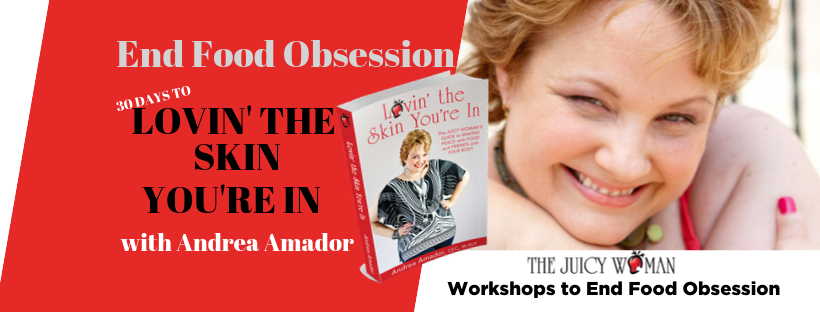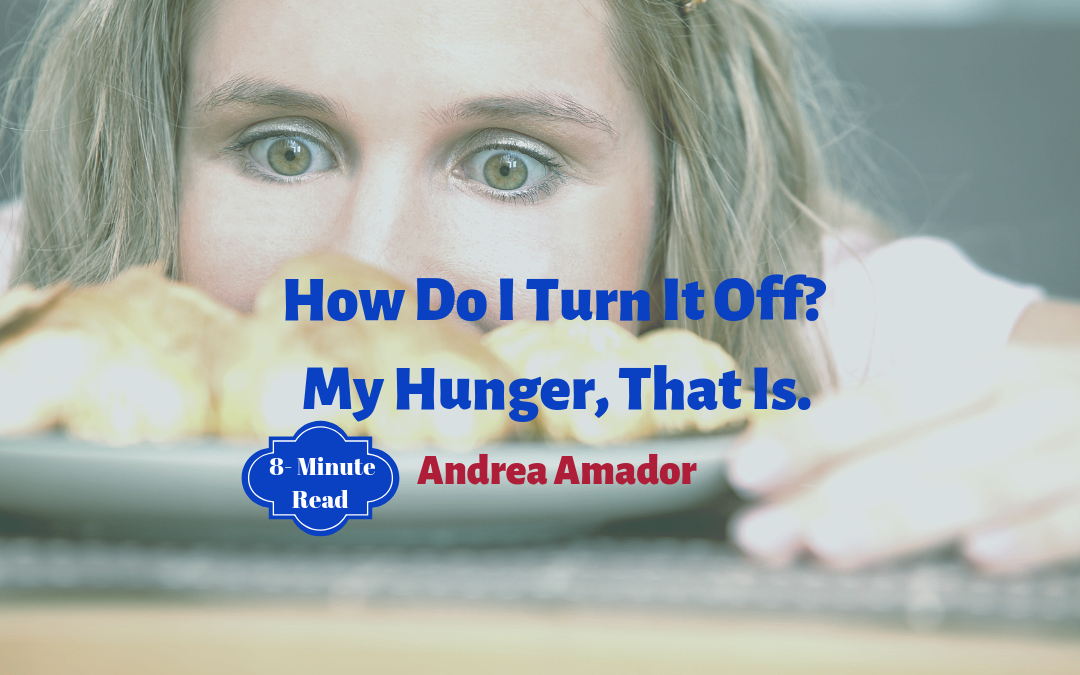Do you spend a lot of time thinking about food and worrying about overeating? If you do, you’re not alone. Here’s why: If you’re an emotional eater, your brain is used to connecting up thoughts of food and eating with comfort. That means that whenever your body feels stressed out, you’re hard wired to reach for food when you’re not hungry.
Your brain can’t tell the difference between reality and your imagination. It reads every anxiety-producing thought you think as a serious threat to your life. Opening up an overdue bill notice, being snubbed by a friend, watching the news, scrolling through FB, wearing tight clothing are all examples of situations that can trigger you to stress you out.
That’s when you may find yourself making a mad dash for the Fritos,™ grabbing a slice of pizza, shoveling down M&Ms™ or in many cases eating whatever is within closest reach when you’re feeling vulnerable. Eating is just your body’s way of trying to calm you down.
Now I know you’ve probably done the diet thing and made yourself nuts over the whole idea of overeating ‘cause you thought the answer was to just ban all the baddies and keep anything tasty out of your house, but the minute you make something seem forbidden, you’ll only crave it so much more. If you’ve got food and comfort linked up in your brain and you’re going through tough times, your cravings for your favorite comfort foods will tie you in knots. They have a way of leading you ’round by the nose, and before you know it, you’re standing in the supermarket line wearing a pair of dark glasses, trying desperately to avoid people’s nasty looks as you hide your ice cream and chips under a huge pile of kale.
Warning bells: Listen to your body’s cries for help!
When you’re in this kind of desperate place, feeling all jittery and nervous needing your food fix, feeling so shameful about wanting to eat those bad foods, your body is trying to tell you, you’re in trouble. Listen to it. What’s actually going on behind the scenes is your brain has picked up on a danger lurking and triggered a tidal wave of stress hormones to rush through your body. Your body responds to that surge of toxins by feeling uncomfortable and you’ll probably notice that your thoughts go crazy with worst case scenarios.
As you reach for that food that promises to slow down your thoughts and calm the chaos, it’s important to understand that there’s a yellow alert going on in your brain, telling you that you are under stress. And in the absence of having other coping strategies besides food, you’ll eat.
Years of dieting has probably taught you that times like these are mistakes best forgotten. Feeling guilty and blaming yourself for your poor judgment, trying to turn it around by paying a penance of starving yourself, overexercising until you’re ready to drop. Overeating is not a sin and there’s no reason to penalize and punish yourself for doing it.
I used to do that a lot. But I don’t play those games with myself anymore and I wouldn’t encourage you to either. Now I realize that during the times when I do overeat, it’s like a cry for help. So I respond by finding out what specifically I need to do to nurture myself and I do what I must to give myself that love.
 Over the past 8 months I’ve lost about 20 pounds.
Over the past 8 months I’ve lost about 20 pounds.  The mixed blessing for me was a run in with depression that pushed me to get really serious about getting healthy. I don’t diet and I keep a bucket of my favorite junk foods at the bottom of my kitchen pantry. It’s so comforting to know that if I want Swedish Fish, Lay’s potato chips, chocolates or Cheetos, they’re there for me. It’s my security blanket. This works beautifully for me, because not only does it keep my binges to an absolute minimum, but it encourages me to dig deeper into healthy eating.
The mixed blessing for me was a run in with depression that pushed me to get really serious about getting healthy. I don’t diet and I keep a bucket of my favorite junk foods at the bottom of my kitchen pantry. It’s so comforting to know that if I want Swedish Fish, Lay’s potato chips, chocolates or Cheetos, they’re there for me. It’s my security blanket. This works beautifully for me, because not only does it keep my binges to an absolute minimum, but it encourages me to dig deeper into healthy eating.
What makes that possible is that I often tell myself now, “I’m worth it.” Here’s a story of what my crazy eating used to look like and the valuable lesson that I learned from it to share with you.
I remember one particular Saturday. It must have been sometime around 2011. I was working at the women’s plus size clothing store, Avenue.
When I woke up that morning, I was a bundle of nervous energy. The night before I had met with my editor, Karen and she told me what was needed to tighten up a few of the chapters from my book, “Lovin’ the Skin You’re In.” I was excited about getting down to writing and finishing them up once and for all.
I also had a sewing project that I planned to get done, and I wanted to do some housework and prep dinner for the next night, but because my time wasn’t really my own, I was a bit on edge.
Knowing that I had agreed to be “on call” to work in the store, my mind was running in a million different directions at once. “Should I go ahead and get ready? Do I dare stay in my pajamas? “This room needs vacuuming. I should have gone to bed earlier. I’m still tired. Shucks, I wanted to finish writing that article and I’ve got to get those rewrites back to Karen. Good grief,
what should I do?” …
It was about 8:00 a.m. I remember walking into the kitchen, and seeing my daughter, Cara making some Rice Krispies® treats. She was about 15 then. She’s always loved cooking. Guess that’s why she’s a professional trained chef now.
She was dipping the treats into her homemade chocolate ganache. Watching her immerse each of the squares into the warm pool of chocolate was making my mouth water. I wondered why, because I don’t like Rice Krispie treats and her chocolate wasn’t chilled. But I asked her if I could taste them anyway. I knew I had become so picky lately, but anyway, I took a bite. Eh! Disgusting. Too warm, too chocolaty, too rich, too much coffee in the ganache and way too soggy. Didn’t want that. Next.
My eyes jumped to the Chips Ahoy® cookies package that was on the counter. I thought to myself, “Mmmm. I like the new style of being able to open the package by pulling at the tear strip.” So responding to my insane thinking, I absentmindedly pulled at the strip and I looked at the cookies.”
Hmmmm. I noticed that they were smaller than they used to be, but I took a bite out of one anyway. It was okay, but nothing special. I walked to the fridge and opened it, looking for something, anything that would excite me. But finding nothing, I closed it again. I did the same with the freezer and cabinets, each of them.
A quick scan of all options in the fridge told me that beside the usual suspects, the offerings were eggs, bacon, English muffins, peanut butter, French toast, pancakes, salad, chicken, soups, Ring Dings®, stale Dipsy Doodles®, a bag of old Candy Corn, old potato chips, a coffee ice cream past it’s prime, an unopened Ben and Jerry’s Brownie Fudge® ice cream, an unopened coffee ice cream, and assorted other goodies which didn’t capture my attention.
At the time I wasn’t yet the almost vegan I am now and I was still eating meat and dairy, so I was considering and rejecting the possibility of making myself some lightly scrambled eggs and having that with a buttered English muffin, I realized that I felt too lazy to cook, so I went back to grab another chocolate chip cookie and then another. It tasted okay, but….then it hit me.
Aha: Knowing What I Needed to Stop My Runaway Hunger Train
As I was listening to myself blabbering away, telling Cara that “they didn’t make the cookies the way they used to”, I realized that I was acting like a lunatic.
My movement, my thoughts and my energy were all over the place. I knew that I felt all this anxiety and I was really upset with myself for agreeing to consider working on a Saturday. What the hell was I thinking?
I realized that was why I was acting crazy and settling for food that I didn’t really want. I told Cara that I needed to resettle myself and I was going to meditate in the Brownie Room. (That was the large room in my home where I used to hold my Brownie meetings back when I was a Girl Scout leader.)
From the moment I sat down, I felt as though I was finally unwinding. Twenty minutes later I was as zen, as zen could be. I was completely neutral about working and was even looking forward to it.
When the phone rang, and it was my boss, Mindy, I greeted her cheerily assuming that she was calling me into work. I was wrong. She gave me the day off.
When I returned to the kitchen, I came back knowing without a doubt that I didn’t want to eat anything. It was finally 2:00 p.m. when I decided that I wanted some pea soup and crackers. And so it goes. That was almost 9 years ago. I was just beginning to dip my toe in the water of learning how to eat in response to my body’s physical hunger.
Even now I’m far from perfect and my choices aren’t always the most stellar. But I’ve come so far from the constant bingeing that I used to do back when I was a dieter. Every occasion became a reason to stop dieting. Vacations, birthdays, Christmas, Easter, New Years’ weekends. One excuse after another to stop dieting. This is not a secret endorsement intended to encourage you to diet. I want to point out some distinctions you may not have thought about for yourself.
Because food was my own way to soothe myself, when I had one of my “Don’t Give a Damn Days- I’m eating whatever I want” that could lead to a binge that would last a month or longer. When something would happen to sweep me off my feet and put me into emotional turmoil, I would run for the comfort of food, continue eating all day long and my only reason to stop would most likely be reaching a point of total disgust and guilt. It was always the cruel voice of my inner critic that kept me running back to dieting.
Now I know quickly when I’m eating for reasons other than satisfying my natural hunger.
What’s the DIF?
How ’bout you? Can you relate to that sliver that I shared of my Saturday morning insanity? Is that something that you grapple with often? I’m here to help.
Let me tell you all about the difference that makes the difference. The DIF – stands for duration, intensity and frequency. When you eat the foods you love and feel safe around them, your relationship with food changes.
That means that whenever you experience episodes of overeating or bingeing, the quality of those binges will change.
The term, “the difference that makes the difference,” is a common expression often used in Neuro Linguistic Programming. NLP is something that I studied for four years to be able to teach my coaching clients how to change the ratty and fatty beliefs that make them feel miserable and ashamed of being emotional eaters.
When we, NLPers say, “What’s the Dif?” It means that there is an action or series of actions that must be taken that will make the difference between getting the outcome of what you want and what you don’t.
Think about healing your emotional eating as being a way to make peace with food so it can become a non-issue in your life. Wouldn’t it be nice to know that you can eat whatever you want and have total faith that you can trust your body to tell you when you’ve eaten enough to satisfy your physical hunger? You can and I can help you do that.
In my Losing Weight without Dieting Program, I teach my coaching clients how to master food so they can get on with living their lives. As emotional eaters, when we’re under stress, we hear the cries of food and run to comfort ourselves by eating. Each time you find yourself overeating, there are really good reasons why you’re doing that. That’s why I teach my clients how to recognize the difference between their body’s physical hunger and other types of hunger.
So let’s look at your goal of wanting to eat less food. Whether you choose to follow a specific diet or you want to do your own thing, your end goal is to reduce your emotional eating.
Overall when you eat to satisfy your body’s hunger, you will be consuming less food and taking in fewer calories. Just like a baby learning how to walk learning how to give up the crutch of emotional eating is going to take some time. Rather than considering your missteps as mistakes, let’s look at them as valuable learning experiences. I always tell my clients that their binges are their best friends. Because it’s in those weak and vulnerable moments of giving into overeating when we can realize that binge is a cry for help.
Maybe up until now, you believed that meant you were being weak-willed or lazy, and you toughened up and used cruelty and shaming as a way of motivating yourself. That will eventually bite you in the butt, and you’ll find yourself right back at the refrigerator using food to feel better. That’s why I teach my Losing Weight without Dieting clients how to eat all the foods they love so they can feel safe around any temptation. I teach them how to combine stress-relief tools with mindful eating techniques.
In the words of Linda, one of my clients, “Now that I know that I can eat as much as I want of something makes me not even want it. If I pack myself full enough that I’m going to explode that’s not what I want. That’s not what I want from food. I want nourishment. I want energy. I want to feel healthy. Most of my life I thought of sweets as a reward and when I wanted a reward I would go looking for sweets. Now I think that healthy food is an even better reward–like fruits. I still have my sweets, but now they’re more in the form of summer fruits, things like that. I still love my ice cream. Wouldn’t give that up, but it’s different now. I have chocolate in the house and I don’t touch it. Just the thought of overeating makes me nauseous.”
My clients come to me after they’ve struggled for years with dieting and realize that dieting has been part of the problem. As an incest and sexual abuse survivor, I specialize in working with women after abuse. I understand the tremendous need survivors have around creating safe spaces in their lives. If you’ve been wrestling with constant thoughts of food, it’s because up until now food has been your safe space.
But if your health is at risk, you are facing the consequences of your body being out of balance. You don’t need the crutch of overeating anymore. That’s why it’s so important to strip the blanket of restriction from the food so you can discover it’s really just food. Permission is power. If you are an abuse survivor, you know what it’s like to feel powerless. Me too. That’s what I teach my clients how to stand in a place of power in their lives by dealing with their stress, and becoming their own best nurturer. It took me years to learn about the power of setting boundaries and how to be more assertive and now I’m thrilled to be able to teach this to my clients.
DIF: A Great Way to Measure Your Progress
Changing your habits takes time. It’s important to accept that this is a process. DIF is an acronym that you can use to measure your progress in moving away from emotional eating and moving toward becoming an intuitive eater or eating like a naturally slender person. By measuring your progress in this way it is much more effective and accurate than getting on a scale. But I’ll cover more about my feelings about that in a future post. Let’s learn more about what the DIF means.
DIF
stands for Duration, Intensity and Frequency. Let me explain:
Duration – length of time between binges – As you learn to listen to your body and eat in response to your hunger, you will notice that the duration of your binges will become lessened.
That means that when you overeat, the length of time you end up overeating will decrease. For example as a dieter or restrictive eater, eating a cookie, may have lead to a binge that lasted for several days.
Yet for someone else with no restrictions on food, a binge or episode of overeating may last a period of a meal or a day.
Intensity – quality and type of food eaten during a binge – As you become more comfortable choosing to eat food that makes your body feel good and eating those foods guilt-free, the intensity of your binges will lessen. For example: This means that rather than bingeing on a plate of fried food, downing that with a chocolate milkshake and finishing it all up with a slice of apple pie a la mode and then eating a bag of potato chips, and then,… (you get the idea) you may instead just find yourself nibbling mindlessly and eating a cookie while you wait for your meal to cook or having a little too much mashed potatoes on your plate.
Having that small bit of extra food in your stomach will be enough for you to know that you’re not feeling comfortable anymore. Overall as long as you are managing your stress consistently, you’ll find yourself less tolerant of eating foods that make you feel uncomfortable. This makes it easy for you to effortlessly gravitate toward making food choices that are what you may consider healthier or ‘better’ for you.
Frequency – how often you binge – As you become more comfortable around food, and your body has gotten the message that you can truly eat whatever you want, you’ll notice that your overeating episodes will become fewer and far between.
Rather than overeating every day and during every meal, you may find yourself only overeating once or twice a week or once a month. That is the goal to reduce the duration, intensity and frequency of your binges without ever having to feel the pain of restriction and deprivation.
So the next time you overdo it on the chocolates, chips or anything else your heart desires, just take a chill pill, look at the bigger picture and ask yourself, What’s really buggin’ me? Because in the final analysis, managing your stress is the key to your success.
If you’re sick and tired of living with food obsession, join me today at 3 p.m. Eastern and I’ll share with you the secrets to losing weight without dieting. Let me tell you how you can eat chocolate and chips and all other tempting goodies to master food so you can get healthy and lighten up at your own pace. For more support and information on my Losing Weight without Dieting Program, click to join my
30 Days to Lovin’ the Skin You’re In Facebook Group


